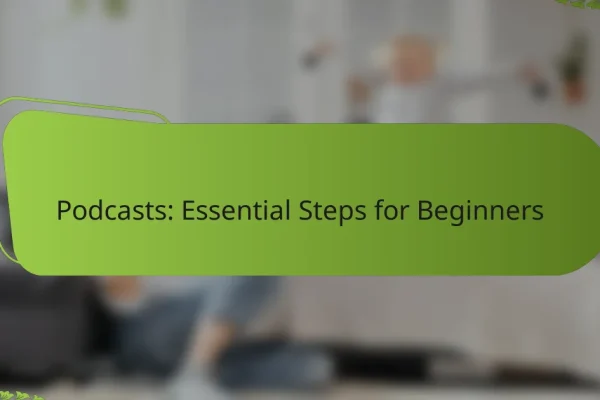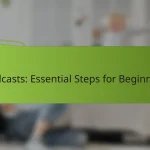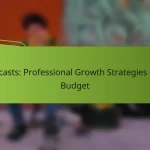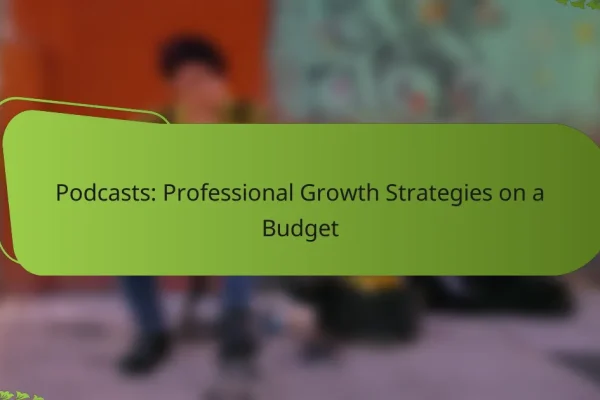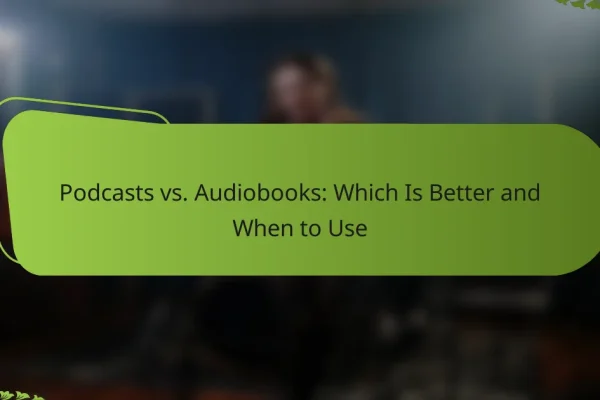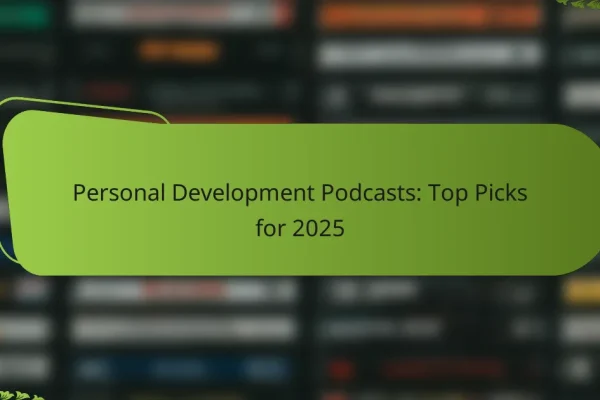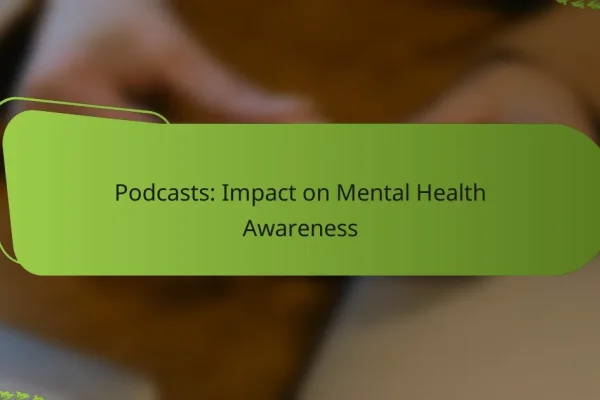How can podcasts enhance continuous learning?
Podcasts can significantly enhance continuous learning by providing accessible content from experts in various fields. They allow listeners to absorb knowledge at their own pace, making it easier to integrate learning into daily routines.
Accessible expert insights
Podcasts often feature interviews with industry leaders, educators, and specialists, offering listeners direct access to expert insights. This format allows individuals to learn from the experiences and knowledge of others without the barriers of traditional education.
For instance, a marketing professional can listen to a podcast featuring successful entrepreneurs discussing their strategies, gaining valuable tips that can be applied immediately in their own work.
Flexible learning schedules
One of the main advantages of podcasts is their flexibility; listeners can tune in during commutes, workouts, or household chores. This adaptability makes it easier to fit learning into busy lifestyles, allowing for consistent engagement with educational content.
Many podcasts are designed to be concise, often lasting between 20 to 60 minutes, making it simple to consume information in manageable segments.
Diverse topics and perspectives
Podcasts cover a vast array of subjects, from technology and science to personal development and culture. This diversity allows listeners to explore new interests or deepen their understanding of familiar topics.
By exposing themselves to different perspectives, learners can develop critical thinking skills and broaden their horizons, which is essential for continuous personal and professional growth.
Community engagement opportunities
Many podcasts foster a sense of community among listeners through social media groups, forums, or live events. Engaging with others who share similar interests can enhance the learning experience and provide networking opportunities.
Participating in discussions or Q&A sessions related to podcast episodes can deepen understanding and encourage the application of new knowledge in real-world scenarios.
What are the best podcasts for continuous learning?
The best podcasts for continuous learning offer diverse insights and knowledge across various fields. They engage listeners with expert interviews, storytelling, and practical advice, making complex topics accessible and enjoyable.
TED Radio Hour
TED Radio Hour takes listeners on a journey through some of the most compelling TED Talks, exploring themes such as innovation, creativity, and human behavior. Each episode features a blend of TED Talks and interviews with the speakers, providing deeper context and insights.
This podcast is ideal for those who appreciate thought-provoking ideas and want to explore various perspectives on personal and societal challenges. It encourages listeners to think critically and apply new concepts in their own lives.
Freakonomics Radio
Freakonomics Radio delves into the hidden side of everything, using economics as a lens to explore everyday issues. The show combines storytelling with data analysis, making complex economic concepts relatable and understandable.
Listeners can expect to learn about a wide range of topics, from incentives to human behavior. This podcast is particularly useful for those interested in how economic principles apply to real-world situations and decision-making.
How I Built This
How I Built This features interviews with entrepreneurs and innovators who share the stories behind the companies and movements they created. Host Guy Raz uncovers the challenges and triumphs these individuals faced on their journeys to success.
This podcast is perfect for aspiring entrepreneurs and anyone interested in business. It provides valuable lessons on resilience, creativity, and the importance of passion in achieving goals.
The Tim Ferriss Show
The Tim Ferriss Show focuses on high-performance strategies and tactics from world-class performers in various fields. Tim Ferriss interviews experts, uncovering their routines, tools, and philosophies that contribute to their success.
This podcast is beneficial for listeners looking to optimize their productivity and personal growth. It offers actionable insights and practical tips that can be applied to everyday life, making it a valuable resource for continuous learning.
How to choose the right podcast for learning?
Selecting the right podcast for learning involves understanding your educational objectives and assessing various options based on those goals. Focus on content relevance, quality, and format to ensure an effective learning experience.
Identify learning goals
Start by clarifying what you want to learn. Are you looking to deepen your knowledge in a specific field, acquire new skills, or stay updated on industry trends? Defining your learning goals will help you filter podcasts that align with your interests.
For example, if your goal is to improve your digital marketing skills, seek podcasts that focus on marketing strategies, tools, and case studies. This targeted approach will enhance your learning efficiency.
Evaluate podcast reviews
Reviews can provide valuable insights into the quality and relevance of a podcast. Look for feedback on platforms like Apple Podcasts or Spotify, where listeners share their experiences and ratings.
Pay attention to comments about the host’s expertise, the depth of content, and the overall production quality. A podcast with consistently high ratings and positive reviews is likely to be a good choice for learning.
Consider episode length
Episode length can significantly impact your learning experience. Shorter episodes, typically ranging from 15 to 30 minutes, are easier to fit into a busy schedule, while longer episodes may provide more in-depth discussions.
Choose based on your available time and attention span. If you prefer bite-sized learning, opt for shorter episodes. However, if you can dedicate more time, longer formats may offer richer content and insights.
What are the benefits of using podcasts over traditional learning methods?
Podcasts offer several advantages over traditional learning methods, including flexibility, accessibility, and cost-effectiveness. They allow learners to absorb information at their own pace and convenience, making education more adaptable to individual lifestyles.
Cost-effective education
Podcasts are often free or available at a low cost, making them an economical choice for learners. Unlike traditional courses that may require hefty tuition fees, many podcasts provide high-quality content without financial barriers.
This affordability allows learners to explore a wide range of topics without significant investment, enabling continuous learning without the stress of accumulating debt.
On-the-go learning
Podcasts excel in providing on-the-go learning opportunities, allowing listeners to engage with educational content while commuting, exercising, or performing household tasks. This multitasking capability makes it easier to fit learning into busy schedules.
For instance, a 30-minute podcast episode can easily replace time spent on social media or watching television, turning otherwise unproductive moments into valuable learning experiences.
Variety of formats
Podcasts come in various formats, including interviews, storytelling, and panel discussions, catering to different learning preferences. This variety keeps the content engaging and allows listeners to choose formats that resonate with their learning styles.
Additionally, many podcasts feature expert guests and diverse perspectives, enriching the learning experience and providing insights that might not be available in traditional classroom settings.
How to integrate podcasts into a learning routine?
Integrating podcasts into a learning routine can enhance knowledge retention and provide flexibility in learning. By selecting relevant topics and scheduling listening times, you can effectively incorporate this medium into your daily life.
Choosing the right podcasts
Selecting the right podcasts is crucial for effective learning. Focus on those that align with your interests or professional goals, ensuring they offer valuable insights or information. Look for podcasts with high ratings or recommendations from trusted sources.
Consider the format and style of the podcasts as well. Some may feature interviews, while others provide narrative storytelling. Choose a style that keeps you engaged and motivated to learn.
Setting a listening schedule
Establishing a consistent listening schedule can help make podcasts a regular part of your learning routine. Aim to dedicate specific times during your day, such as during commutes or workouts, to listen to episodes. This can create a habit that reinforces your learning.
Start with a manageable goal, such as one episode per day or a few episodes per week, and adjust based on your availability and interest. Consistency is key to maximizing the benefits of podcast learning.
Taking notes and reflecting
Taking notes while listening to podcasts can enhance retention and understanding. Jot down key points, interesting ideas, or questions that arise during the episode. This practice encourages active engagement with the material.
After listening, spend a few minutes reflecting on what you learned. Consider how the information applies to your life or work, and think about ways to implement new ideas. This reflection solidifies your learning and encourages deeper thinking.
